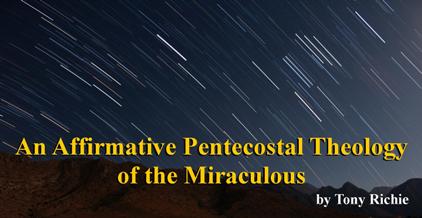An Affirmative Pentecostal Theology of the Miraculous

Introduction
I am personally fully persuaded that the Pentecostal/Charismatic movements have been raised up by God in manifestation of the miraculous power of the Holy Spirit through the Lord Jesus Christ. However, I have noticed two reflex reactions that often occur when the subject of miracles is raised. Either a defensive stance or a polemical mode is soon evident. A defensive stance can appear when someone who affirms the reality of miracles in the Bible and in the daily life of faith is confronted by someone who challenges that very possibility. A polemical mode can appear when someone who challenges what appears to be an incredulous acceptance of so-called inexplicable events is confronted with someone who believes that miracles do happen. As much as possible, I mean to avoid such negative and non-productive reactionary modes by developing an understanding that is non-defensive and non-polemical. In a word, it will be positive—and therefore, hopefully, constructive and productive.
The Pentecostal/Charismatic movements have been raised up by God in manifestation of the miraculous power of the Holy Spirit through the Lord Jesus Christ.
Supernatural Worldview
Pentecostals believe that God the Creator is active and involved with creation and creatures, especially with people of faith. God is not passive or distant.
The subject of miracles is not merely theoretical for Pentecostals.
Next, Pentecostals believe the realities of the cosmos exceed what can be quantifiably measured by man. There is more to life than can be studied in a laboratory. Without discounting the importance of scientific processes, indeed, with all due appreciation and respect for its appropriate use, Pentecostals are not at all ready or willing to limit all life entirely to that narrow account. To do so is the height of human arrogance. Pentecostals, therefore, embrace a cosmology recognizing the existence and activity of spiritual beings or entities in relationship with the so-called natural or sensory perceived world of being. Again, this cosmology (and ontology) is also rooted in the nature of “the God of the spirits of all flesh” (Numbers 16:22; 27:16; cp. Hebrews 12:9). Indeed, Christian anthropology requires recognition of the essentially spiritual nature of human identity and existence (1 Corinthians 14:32; Hebrews 12:23). Consistent with this affirmation of the holistic nature of all existence, Pentecostals not surprisingly expect there to be miraculous moments when the thin veil between Heaven and Earth is opened up and interactive encounters occur in myriad forms that may include otherwise inexplicable events as well as experiences of dreams, visions, and other divine communications and revelations (e.g. Genesis 22:11, 15; 28:12; Acts 2:2; 7:55-56; 9:3; Revelation 4:1-2).
Certainly, these intuitively insightful ways of being and knowing can fly in the face of reductionist systems prone to deny any but rationalistic and naturalistic versions of reality. However, Pentecostal spirituality and theology do not contradict logic or reason so much as they transcend them, rising above their aridity and rigidity to affirm and embrace a larger, more expansive and inclusive, vision of the nature of reality. It is not reason or scientific knowledge per se which is problematic but their misuse in the exclusion of the supernatural out of infatuation for the natural. We need not denigrate human logic or reason, much less the natural created order; but, we must not deify them either. At the risk of sounding harsh, I sometimes wonder if the outlandish fetish-like fascination of modern society with the material world order might be nothing other than a sophisticated violation of the Decalogue’s prohibition against idolizing the creaturely (Exodus 20:4). In any case, it appears evident that Pentecostalism’s belief in the supernatural is an inseparable part of its overall theological make up; it simply cannot be jettisoned without violating its own innermost ethos. And yet in their affirmation of the miraculous Pentecostal Christians are notoriously out of step with most of the modern world. Or are they?
Category: Spirit, Spring 2015


